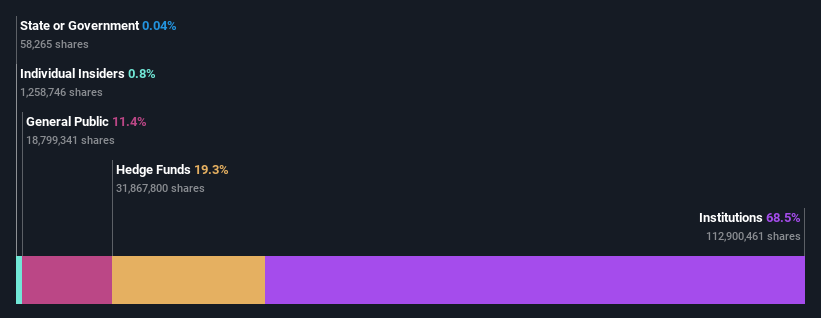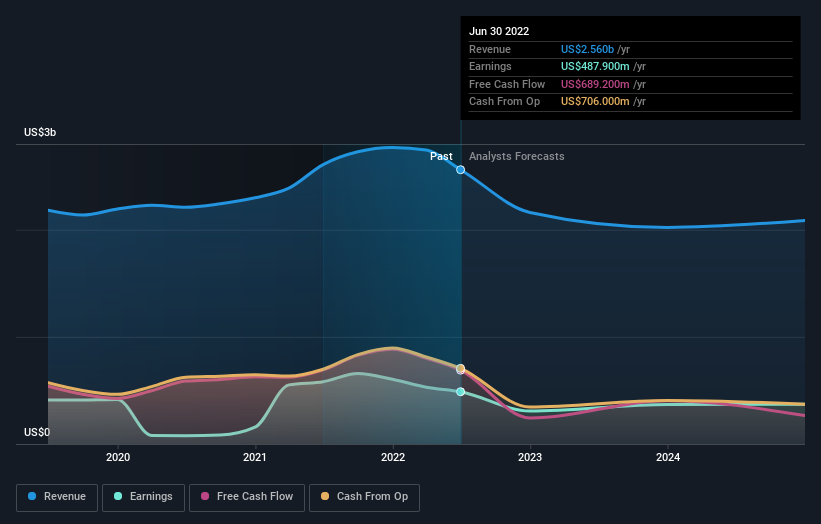Janus Henderson Group plc's (NYSE:JHG) recent 6.1% pullback adds to one-year year losses, institutional owners may take drastic measures
To get a sense of who is truly in control of Janus Henderson Group plc (NYSE:JHG), it is important to understand the ownership structure of the business. And the group that holds the biggest piece of the pie are institutions with 68% ownership. In other words, the group stands to gain the most (or lose the most) from their investment into the company.
And institutional investors endured the highest losses after the company's share price fell by 6.1% last week. This set of investors may especially be concerned about the current loss, which adds to a one-year loss of 44% for shareholders. Often called “market makers”, institutions wield significant power in influencing the price dynamics of any stock. As a result, if the downtrend continues, institutions may face pressures to sell Janus Henderson Group, which might have negative implications on individual investors.
In the chart below, we zoom in on the different ownership groups of Janus Henderson Group.
View our latest analysis for Janus Henderson Group
What Does The Institutional Ownership Tell Us About Janus Henderson Group?
Institutions typically measure themselves against a benchmark when reporting to their own investors, so they often become more enthusiastic about a stock once it's included in a major index. We would expect most companies to have some institutions on the register, especially if they are growing.
As you can see, institutional investors have a fair amount of stake in Janus Henderson Group. This can indicate that the company has a certain degree of credibility in the investment community. However, it is best to be wary of relying on the supposed validation that comes with institutional investors. They too, get it wrong sometimes. It is not uncommon to see a big share price drop if two large institutional investors try to sell out of a stock at the same time. So it is worth checking the past earnings trajectory of Janus Henderson Group, (below). Of course, keep in mind that there are other factors to consider, too.
Since institutional investors own more than half the issued stock, the board will likely have to pay attention to their preferences. It looks like hedge funds own 19% of Janus Henderson Group shares. That catches my attention because hedge funds sometimes try to influence management, or bring about changes that will create near term value for shareholders. Trian Fund Management, L.P. is currently the largest shareholder, with 19% of shares outstanding. BlackRock, Inc. is the second largest shareholder owning 12% of common stock, and The Vanguard Group, Inc. holds about 8.3% of the company stock.
We did some more digging and found that 6 of the top shareholders account for roughly 53% of the register, implying that along with larger shareholders, there are a few smaller shareholders, thereby balancing out each others interests somewhat.
Researching institutional ownership is a good way to gauge and filter a stock's expected performance. The same can be achieved by studying analyst sentiments. There are a reasonable number of analysts covering the stock, so it might be useful to find out their aggregate view on the future.
Insider Ownership Of Janus Henderson Group
While the precise definition of an insider can be subjective, almost everyone considers board members to be insiders. The company management answer to the board and the latter should represent the interests of shareholders. Notably, sometimes top-level managers are on the board themselves.
Most consider insider ownership a positive because it can indicate the board is well aligned with other shareholders. However, on some occasions too much power is concentrated within this group.
Our information suggests that Janus Henderson Group plc insiders own under 1% of the company. Keep in mind that it's a big company, and the insiders own US$29m worth of shares. The absolute value might be more important than the proportional share. It is always good to see at least some insider ownership, but it might be worth checking if those insiders have been selling.
General Public Ownership
The general public, who are usually individual investors, hold a 11% stake in Janus Henderson Group. While this size of ownership may not be enough to sway a policy decision in their favour, they can still make a collective impact on company policies.
Next Steps:
It's always worth thinking about the different groups who own shares in a company. But to understand Janus Henderson Group better, we need to consider many other factors. For instance, we've identified 3 warning signs for Janus Henderson Group that you should be aware of.
But ultimately it is the future, not the past, that will determine how well the owners of this business will do. Therefore we think it advisable to take a look at this free report showing whether analysts are predicting a brighter future.
NB: Figures in this article are calculated using data from the last twelve months, which refer to the 12-month period ending on the last date of the month the financial statement is dated. This may not be consistent with full year annual report figures.
Have feedback on this article? Concerned about the content? Get in touch with us directly. Alternatively, email editorial-team (at) simplywallst.com.
This article by Simply Wall St is general in nature. We provide commentary based on historical data and analyst forecasts only using an unbiased methodology and our articles are not intended to be financial advice. It does not constitute a recommendation to buy or sell any stock, and does not take account of your objectives, or your financial situation. We aim to bring you long-term focused analysis driven by fundamental data. Note that our analysis may not factor in the latest price-sensitive company announcements or qualitative material. Simply Wall St has no position in any stocks mentioned.
Join A Paid User Research Session
You’ll receive a US$30 Amazon Gift card for 1 hour of your time while helping us build better investing tools for the individual investors like yourself. Sign up here

 Yahoo Finance
Yahoo Finance 

